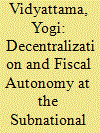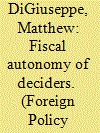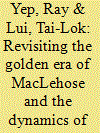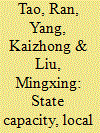| Srl | Item |
| 1 |
ID:
181826


|
|
|
|
|
| Summary/Abstract |
This article revisits the issue of fiscal autonomy at the subnational level following the implementation of Indonesia’s 2001 decentralization reforms. Its main research question is whether the reforms allow a bigger space for local governments to generate their own revenue and fund their initiatives. To this end, the article analyses the size and proportion of intergovernmental transfers from the centre to local and provincial governments since the start of decentralization. It then assesses the funds that subnational governments have to finance their own programmes and initiatives, as well as the proportion of revenue that these governments raise themselves. The study argues that, despite changes in legislation, responsibility for expenditure has been consistently handed to local and, to a lesser extent, provincial governments. However, this has not translated into greater autonomy for them to establish and finance their own initiatives. Conversely, local governments have been pushing for more control over their revenue by introducing various taxes and user charges. This has resulted in a slight increase in the proportion of revenue raised at the local level.
|
|
|
|
|
|
|
|
|
|
|
|
|
|
|
|
| 2 |
ID:
140282


|
|
|
|
|
| Summary/Abstract |
Liberal theory claims that the constraint taxpayers impose on military expenditure is an important mechanism through which democracy and international commerce help prevent conflict. However, leaders with affordable access to sovereign credit have often overcome this constraint by raising revenue on credit markets. By minimizing or deferring the economic burden imposed on taxpayers and the macroeconomic stress associated with alternative financing strategies, I argue that these leaders have greater autonomy to pursue an aggressive foreign policy if they so desire. Leaders that lack creditor confidence risk increased political opposition and removal from office if hostilities generate macroeconomic stress or disturb the domestic fiscal balance. They also face a higher likelihood of defeat or retreat, and the subsequent political consequences, if they pursue conflict without sufficient resources. Estimates of a heteroskedastic probit model support this hypothesis and indicate that creditworthy states initiate conflict with a greater mean probability and greater variance than their noncreditworthy counterparts.
|
|
|
|
|
|
|
|
|
|
|
|
|
|
|
|
| 3 |
ID:
100995


|
|
|
|
|
| Publication |
2010.
|
| Summary/Abstract |
The so-called "MacLehose era" has been fondly remembered as a period marking the turning point in colonial rule in Hong Kong and its socioeconomic development in the postwar decades. This article, however, argues that it was London's initiatives summarized in the document Hong Kong Planning Paper that accounted for the acceleration of social reforms in the 1970s. Contrary to popular perception, MacLehose, who was beholden to local constraints, appeared to be a reluctant reformer. His inclination to defend his vision of the colony's interests brought him into heated exchanges and debates with British officials who were driven by different political calculations and strategic concerns back home. The altercations uncovered in this article reveal that the colony's perimeter for action is certainly defined by the position of the sovereign; yet, the outcome of the process was hardly preordained. Beneath the facade of subservience and accommodation, colonial administrators had stubbornly defended their vision of local interests and tried to implement the reforms at their own pace. They appeared not to be swayed by the asymmetry of power in constitutional terms.
|
|
|
|
|
|
|
|
|
|
|
|
|
|
|
|
| 4 |
ID:
092871


|
|
|
|
|
| Publication |
2009.
|
| Summary/Abstract |
Continued urban-rural income disparity poses a serious policy challenge in China's economic transition. As the Chinese economy booms and the state's fiscal capacity grows, there should be a corresponding increase in the center's capacity to redress urban-rural inequality. However, it seems that the stronger state extractive capacity since the mid-1990s has not translated into better urban-rural disparity outcomes. Based on a panel data set covering 270 prefectures in China between 1994 and 2003, the article evaluates the impact of local fiscal spending on urban-rural income disparity. Findings reveal a strong urban bias in China's local fiscal system under an increasingly centralized fiscal system. The centralized fiscal model has in fact reinforced this tendency and ironically weakened the capacity of the central state in achieving the policy goal of reducing the urban-rural divide.
|
|
|
|
|
|
|
|
|
|
|
|
|
|
|
|